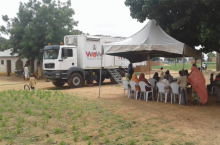Kaduna State and WHO scale up COVID-19 and TB search with mobile testing in communities
Kaduna, 6 August 2020 - World Health Organization (WHO) Nigeria has supported the screening of 2306 persons for COVID-19 and 2506 persons for Tuberculosis (TB), using Chest X-Ray, and GeneXpert machine through mobile testing in Kaduna State communities. Already, 265 COVID-19 cases and 105 presumptive with eight TB cases were diagnosed in six weeks (June and July 2020).
Presently, Kaduna State is witnessing over 50% reduction in hospital attendance and access to services due to disruption of routine essential services and programmes resulting from prioritization of COVID-19 response.
In renewed efforts to tackle COVID-19 alongside TB in Nigeria, a disease that claims about 18 deaths per hour and over 157 000 lives annually, WHO Nigeria in collaboration with the Kaduna State Government and KNCV Tuberculosis Foundation, co-facilitated implementation of an integrated community testing for the two disease conditions using a mobile itinerant TB diagnostic facility called “Wellness On Wheels” Truck (WOW Truck).
Launching the intervention recently, the Governor of Kaduna State, Mallam Nasir El-Rufai reiterated his commitment curtailing spread both diseases. He further stated that, “We are thankful to USAID and WHO for collaborating with us in our efforts to eliminate TB and COVID-19 scourge in Kaduna”.
In 2019 alone, Nigeria notified of 120,266 TB patients. Therefore, to optimize outputs from the initiative in Kaduna, WHO co-facilitated training of laboratory personnel on the use of SARS CoV-2 cartridges to provide integrated TB testing in the State.
WHO is also providing regular supportive supervision to the State government to sustain the initiative through upgrading existing health facilities with Gene Xpert machines, installation and certification of Biosafety level 2 cabinets and provision of uninterrupted Personal Protective Equipment (PPE).
“This is a big leap towards achievement of Universal Health Coverage (UHC). The integrated diagnostic services for Covid-19 along with TB, Malaria, HIV and hepatitis ensured routine surveillance and management, and minimized the disruptive effect of the Covid-19 pandemic on these essential services and the suffering of the public” Stated Dr Moses Onoh WHO National Professional Officer for TB in the Northwest.
He added that “high risk border communities for COVID-19 in Kaduna which include Kawo in Kaduna North LGA and Kakuri in Kaduna South LGA, Zaria LGA, Maikarfi LGA have benefitted from the community testing intervention. These areas are remotely located and lack access to essential health services. They were able to access screening, testing and treatment services for COVID-19, TB, Malaria, HIV and Hepatitis at their door steps than previously done. They now have a “sense of belonging and feeling of wellbeing” as exclaimed by several community leaders encountered in the course of the intervention.”
Malama Aishatu Abdulahi a 58-year-old mother of five in Markarfi community was very elated to have benefited from the programme, “we thank God and the government for sending this moving hospital to come to our village to help us with the tests and medicines, I have not gone to the hospital in a long time and this gave me and my family the opportunity to see a doctor. We hope that government will it a regular intervention.”
The mobile diagnostic facility which was launched in mid-June, 2020, has drastically increased access of community members to not only TB testing, but also COVID-19 and other deadly diseases with timely linkage to management/treatment. It has significantly reduced the turnaround time for test results given the high volume of samples collected for processing.
WHO Nigeria continues to support provision of quality TB services as well as expansion of diagnosis and treatment for TB including effective implementation of the Global Fund and USAID grants for TB control while strengthening the Health System to sustain TB and COVID-19 control efforts in Nigeria.
Technical Contacts:
Dr Rex Mpazanje; Email:mpazanjer [at] who.int; Tel: +234 803 960 0874
Dr Awe Ayodele; Email: awea [at] who.int; Tel: +234 803 525 0215

